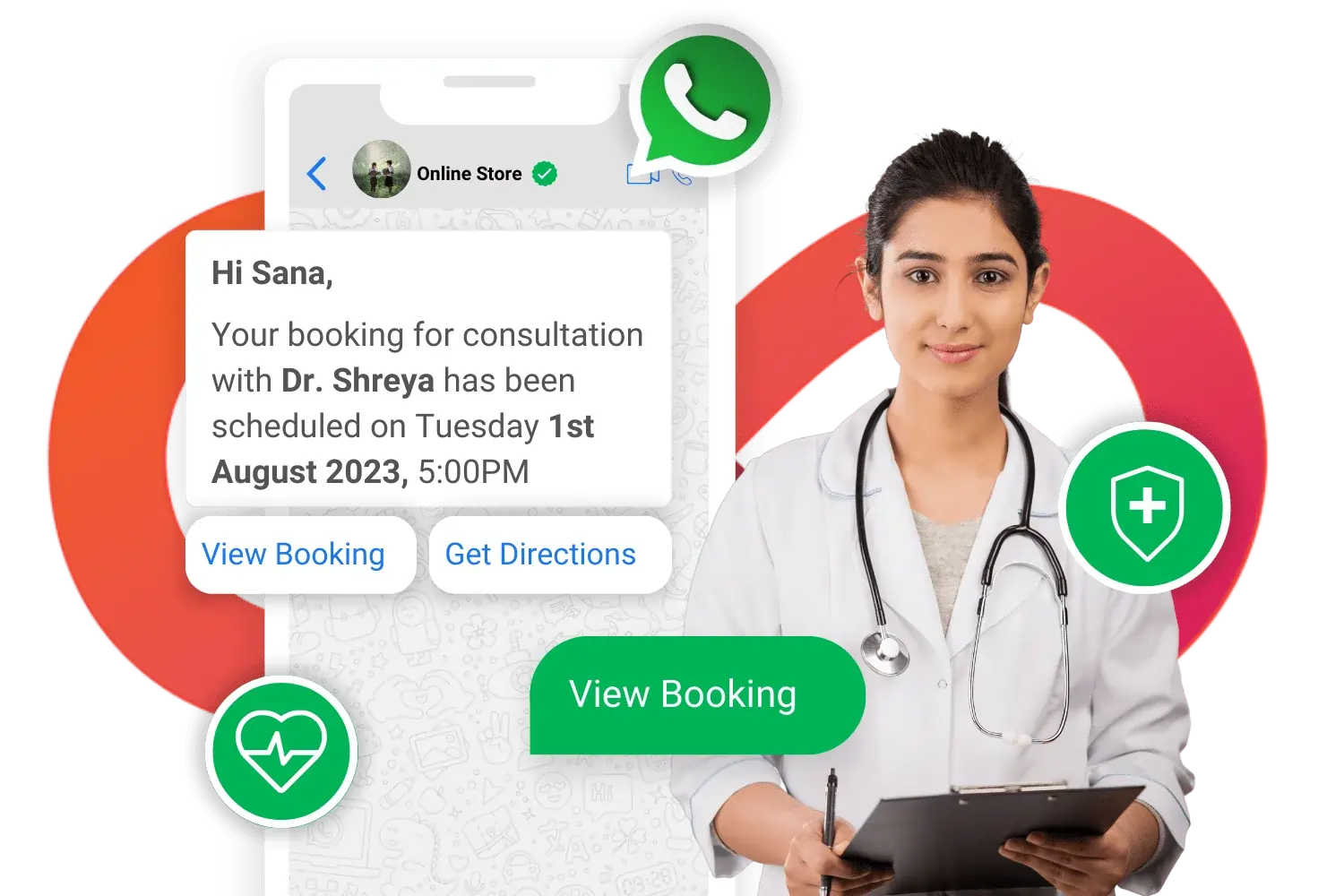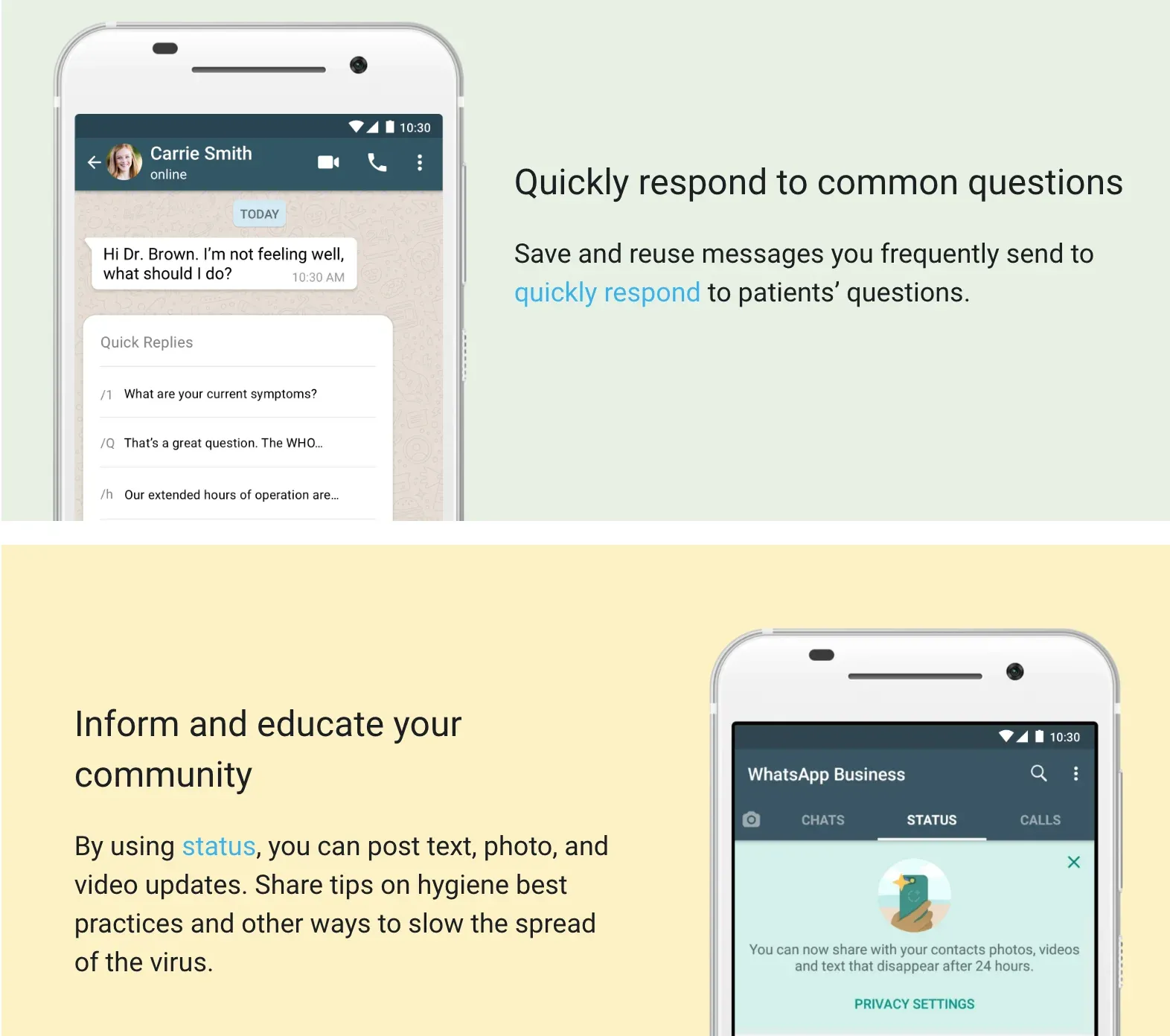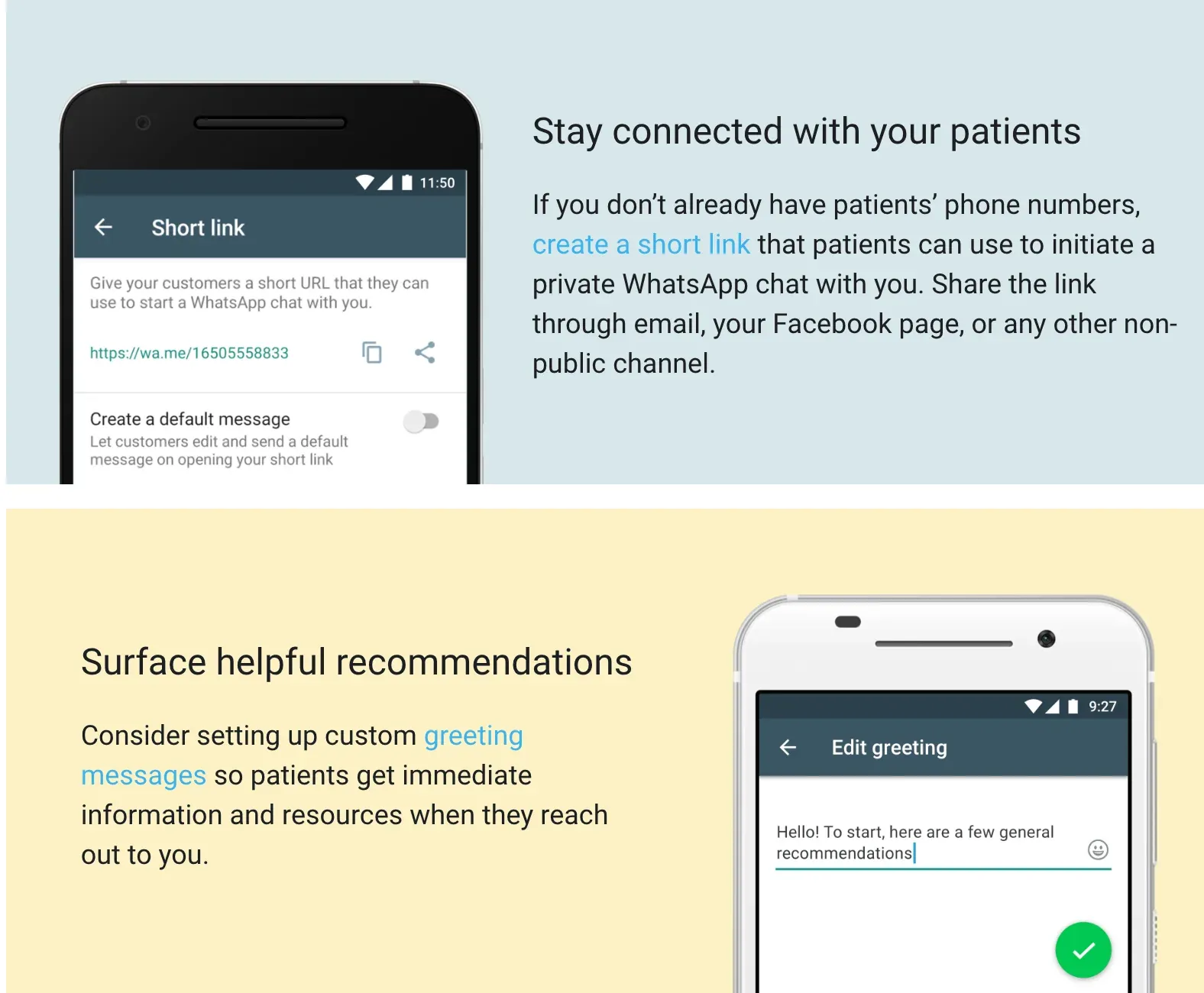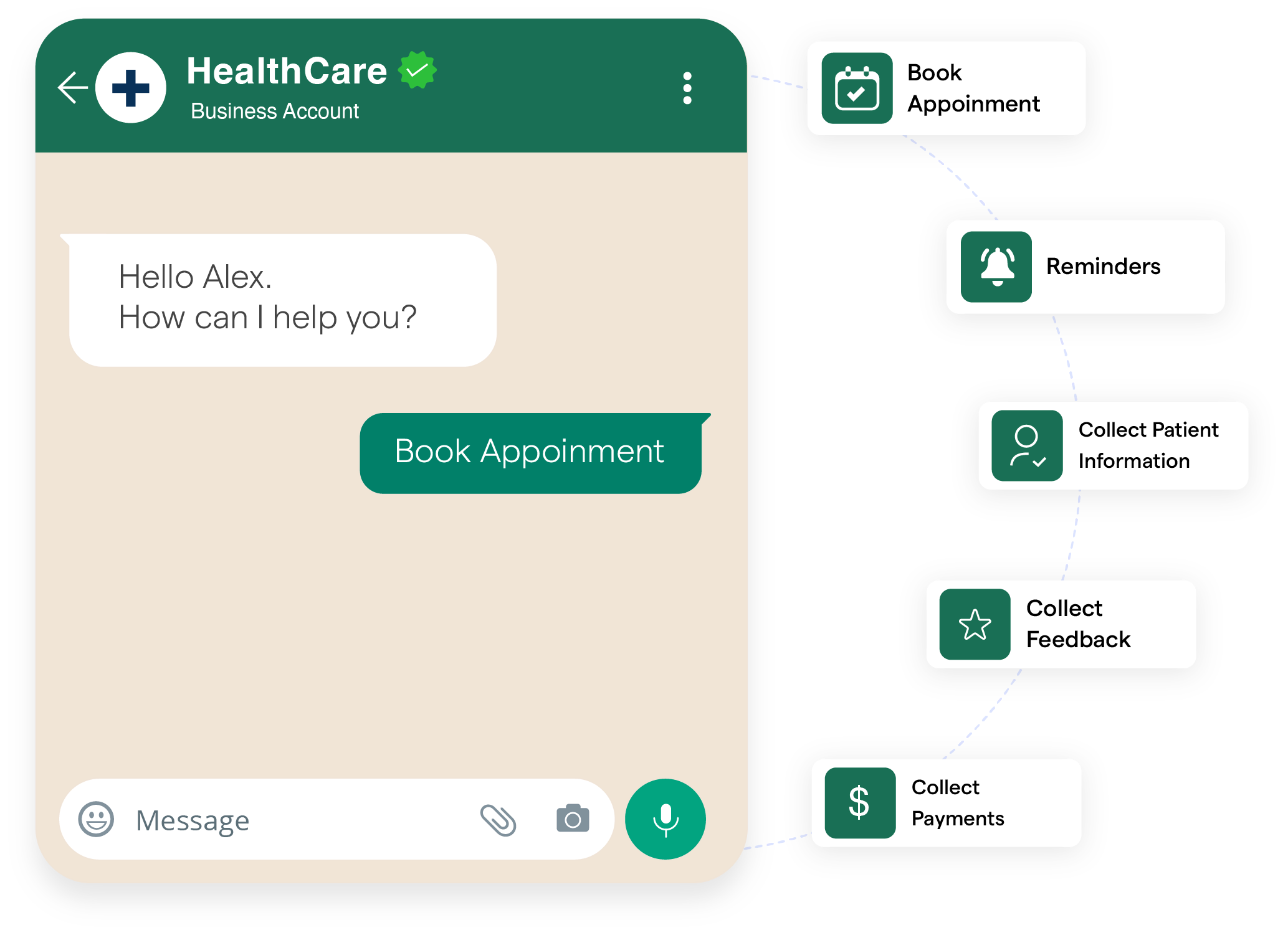Introduction
The COVID-19 pandemic necessitated remote options for care delivery. With that WhatsApp has attracted the attention of healthcare organizations exploring better ways to engage with patients.
Recent data highlights WhatsApp's accelerating adoption in healthcare. A 2021 study found 65% of US hospitals now use WhatsApp to interact with patients, up significantly from 37% in 2019 by Spok.
WhatsApp now enables organizations to develop interactive chatbots on its platform for automated communications with patients about appointment reminders, medication prompts, symptom surveys and more. These bots can dramatically improve efficiency and access.
WhatsApp’s functionalities like messaging, voice and video calls enabled providers to safely consult patients. This catalyzed rapid mass adoption of WhatsApp across healthcare systems. As seamless communication becomes fundamental to healthcare in a digital age, WhatsApp is positioned to be the future driver of patient-provider connection.
So continue reading to know more about WhatsApp - the future of healthcare communication.
Why is WhatsApp important in healthcare?

In today's digital world, technology has become an integral part of our lives, influencing various sectors including healthcare. One such technological marvel that has revolutionized the healthcare industry is WhatsApp. You might be wondering, why is WhatsApp in healthcare important? Well, let's find out!
Increasing Accessibility and Efficiency
WhatsApp has transformed the way healthcare professionals communicate by enabling easy access to medical information and enhancing efficiency. With WhatsApp, doctors can quickly communicate and share patient records, test results, and medical images with colleagues and specialists, regardless of their location. This eliminates the need for physical transfers, saving time and effort.
Moreover, patients can easily reach out to doctors for appointments, clarifications, or emergencies, ensuring prompt and efficient healthcare services.

Enhanced Patient Care
Another significant advantage of using WhatsApp in healthcare is the improved patient care it facilitates. Doctors can provide personalized and timely advice to patients through text messages or even audio calls, ensuring continuous patient monitoring. This direct and convenient communication leads to faster diagnoses, tailored treatment plans, and overall improved patient outcomes.
Moreover, WhatsApp groups can be created to connect doctors, nurses, and caregivers, allowing for collaborative care, sharing of knowledge and expertise, and ensuring comprehensive patient support.
Streamlining Internal Communication
WhatsApp in healthcare plays a vital role in streamlining internal communication within healthcare organizations. By creating dedicated groups for specific departments or teams, healthcare professionals can effortlessly communicate and coordinate patient care.
The benefits of WhatsApp in healthcare are effective teamwork, better patient management, and smoother workflows. Medical staff can quickly inform each other about emergencies, share updates, and schedule meetings, improving overall organizational efficiency and reducing communication gaps.
When and Where is WhatsApp used in Healthcare?
WhatsApp has gained significant popularity in the healthcare industry. This user-friendly messaging platform has found its way into various aspects of healthcare, providing immense value to both patients and healthcare professionals. Let's take a closer look at when and where WhatsApp is used in healthcare!
Patient-Provider Communication
WhatsApp has become a game-changer when it comes to patient-provider communication. Patients can effortlessly reach out to their healthcare providers for appointments, clarifications, or even urgent medical advice. This instant and direct communication channel ensures that patients receive prompt responses and personalized care.
Doctors can provide guidance, answer general health questions, or even arrange telemedicine appointments through WhatsApp, making healthcare more accessible and convenient for patients.

Remote Patient Monitoring
With the rise of remote healthcare services, WhatsApp has emerged as a valuable tool for remote patient monitoring. Healthcare professionals can use this platform to remotely track and monitor patients' health conditions. Patients can share relevant information such as vital signs, symptoms, or even images of physical ailments through WhatsApp.
The benefits of WhatsApp in healthcare enable doctors to provide continuous care, make timely interventions, and adjust treatment plans as needed; all while patients stay in the comfort of their own homes.
Suggested Reading:
Team Collaboration
WhatsApp is not just limited to patient-provider interactions; it also enhances team collaboration within healthcare organizations. By creating dedicated groups for specific departments or multidisciplinary teams, healthcare professionals can easily communicate, share updates, and collaborate on patient care. This streamlined WhatsApp healthcare communication leads to better coordination, breaks down silos, and promotes efficient teamwork. It ultimately resulted in improved patient outcomes.
Community Engagement
WhatsApp has also proven to be a powerful tool for community engagement in healthcare. Healthcare organizations can create WhatsApp groups or broadcast lists to disseminate important health information, promote health campaigns, or conduct patient education sessions.
These groups allow for two-way communication, allowing community members to ask questions, seek guidance, and receive valuable health-related information from healthcare professionals. This level of community engagement fosters trust, encourages healthy behaviors, and empowers individuals to take control of their health.
How is WhatsApp impacting healthcare communication?
In this section, we’ll see how WhatsApp is impacting healthcare communication.

Economical and Accessible Communication
WhatsApp is a low-cost and easily accessible communication platform that has revolutionized healthcare communication. Healthcare organizations can leverage WhatsApp's simplicity to reach patients and other healthcare providers instantaneously from any device or location. This has improved healthcare access and communication for hard-to-reach patients such as those in rural and remote areas.
Improved Patient Engagement and Outcomes
With WhatsApp as a communication tool, patients can connect with healthcare providers instantly. As it provides them access to a real-time connection with doctors and nurses, improving healthcare accessibility, and patient response times. It has improved patient engagement and outcomes in healthcare communication.
Patients feel more connected to their healthcare providers, and this has led to increased medical literacy, self-advocacy, and symptom management. The ability of WhatsApp to support multimedia messages, such as pictures and videos, has empowered patients to have a better understanding of their health status and medications.
Efficient Workflow and Care Coordination
WhatsApp healthcare communication and care coordination are essential components of effective healthcare service delivery. With WhatsApp, healthcare professionals can quickly reach out to other team members, discuss patient cases, and collaborate on clinical decisions. Also, WhatsApp-enhanced communication allows for quicker clinical responses to emergencies, thereby minimizing mistakes and optimizing outcomes.
Suggested Reading:
Challenges and Concerns
While WhatsApp has demonstrated its potential in healthcare communication, certain challenges and concerns need to be addressed to ensure its effective and responsible use within the healthcare industry. Let's explore some of these challenges and considerations below.
Security and Privacy
When it comes to healthcare communication, ensuring the security and privacy of patient information is paramount. WhatsApp, being a third-party platform, raises concerns about data security and confidentiality.
While WhatsApp offers end-to-end encryption, ensuring that messages are only visible to the sender and recipient, there is still a risk of data breaches or unauthorized access. Healthcare organizations must take measures to ensure HIPAA compliance and implement strong security protocols, such as two-factor authentication and regular data backups, to protect patient information.
Legal and Ethical Considerations
The use of WhatsApp in healthcare communication also presents legal and ethical dilemmas. Healthcare professionals need to be mindful of regulations and laws surrounding patient data and privacy. Sharing patient information through WhatsApp could potentially violate patient confidentiality if not done securely.
Furthermore, healthcare providers must obtain appropriate consent from patients before engaging in communication through WhatsApp. Healthcare organizations need to maintain a balance between leveraging the benefits of technology and mitigating legal and ethical risks.
The Future of WhatsApp in Healthcare
In this section, we will explore the potential for further integration of WhatsApp in healthcare communication and predict the impact of emerging technologies on healthcare communication via WhatsApp.
The Potential for Further Integration of WhatsApp in Healthcare Communication
Here is a glimpse of the future of WhatsApp in Healthcare.
- Ease of Communication
Communication is the backbone of any healthcare system, and WhatsApp has made communication easier than ever before. Patients can easily get in touch with their doctors and healthcare practitioners can quickly respond to their questions and concerns. This saves time and effort for both parties, making healthcare services much more accessible.
- Privacy Concerns
While WhatsApp is great for facilitating easy communication, privacy concerns have been raised. WhatsApp's end-to-end encryption protocol ensures that messages cannot be intercepted, but this encryption also means that messages cannot be traced if they contain sensitive medical information. WhatsApp needs to introduce stringent data privacy protocols to eliminate such concerns.
- Efficiency in Telemedicine and Remote Consultations
The ongoing pandemic has resulted in remote consultations, and WhatsApp has proved to be a reliable tool for telemedicine consultations. Being available for free and having a user-friendly interface, WhatsApp has made remote consultations much more streamlined and accessible.
Predicting the Impact of Emerging Technologies on Healthcare Communication via WhatsApp
The impacts will be the following:
Artificial Intelligence (AI)
With AI, WhatsApp can provide healthcare practitioners with instant language translation to converse with patients who speak different languages. This can increase the efficiency of communication and make healthcare much more accessible, especially for patients who do not speak the language of the healthcare practitioner.
And, if you want to begin with chatbots but have no clue about how to use AI to train your chatbot, then check out the NO-CODE chatbot builder, named BotPenguin.
With all the heavy work of chatbot development already done for you, BotPenguin allows users to integrate some of the prominent language models like GPT 4, Google PaLM and Anthropic Claude to create WhatsApp AI chatbots with features like:
- Marketing Automation
- WhatsApp Automation
- Customer Support
- Lead Generation
- Facebook Automation
- Appointment Booking
Virtual Reality (VR)
VR technologies can be used for remote consultations with patients who may have mobility restrictions. Thereby saving patients the time and effort required to visit a clinic or hospital. Healthcare practitioners can also use VR technology to explain complex medical procedures to patients.
Smart Devices and IoT
Smart devices and the Internet of Things (IoT) can be integrated with WhatsApp to provide real-time medical monitoring. Healthcare practitioners can use this data to make informed decisions about patient care.
Conclusion
In conclusion, WhatsApp shows immense potential as the communication platform of the future for healthcare through its vast user network, accessibility and multi-functionality. Research confirms that adoption of WhatsApp in health organizations already has strong momentum, accelerated especially by pandemic-driven necessity for remote care options.
Rapid, reliable communication between healthcare professionals is crucial for smooth collaboration and patient safety. WhatsApp groups and broadcasts enable instant sharing of important updates across provider teams. With burgeoning chronic diseases, patient education is essential for prevention and self-management. WhatsApp offers a platform to deliver materials like articles, infographics and videos to promote health literacy.
WhatsApp voice and video calls facilitate remote consultations, enabling providers to assess and treat minor conditions online to reduce healthcare system strain.
Thoughtful implementation of WhatsApp, augmented by workflow integration strategies contributed by BotPenguin, leads to the most successful adoption. As more stakeholders apply WhatsApp across patient services – scheduling, care delivery, coordination – systems are optimized for better responsiveness and outcomes. This sets the foundation for WhatsApp to transform healthcare communication worldwide. And you do it better with BotPenguin chatbots!
Suggested Reading:
WhatsApp Chatbot for Healthcare Support: Provide better care
Frequently Asked Questions (FAQs)
Can healthcare providers securely communicate with patients through WhatsApp?
Yes, healthcare providers can securely communicate with patients through WhatsApp by ensuring compliance with privacy regulations, using end-to-end encryption, and implementing secure messaging features.
How can WhatsApp improve healthcare communication efficiency?
WhatsApp can improve healthcare communication efficiency by enabling real-time messaging, quick sharing of medical information, and streamlined coordination among healthcare teams, resulting in faster decision-making and improved patient care.
Can WhatsApp facilitate communication between healthcare professionals in different locations?
WhatsApp enables seamless communication between healthcare professionals in different locations, enhancing collaboration, knowledge-sharing, and consultation among doctors, nurses, specialists, and other healthcare team members.
Are patient privacy and data security maintained when using WhatsApp for healthcare communication?
Maintaining patient privacy and data security is crucial. Healthcare professionals should adhere to privacy regulations, use secure messaging options, and avoid sharing sensitive information through regular WhatsApp chats.
Is it possible to integrate WhatsApp with electronic health record (EHR) systems?
Yes, it is possible to integrate WhatsApp with EHR systems, allowing seamless transfer of patient information, test results, and medical records between healthcare professionals while maintaining data security and privacy.


